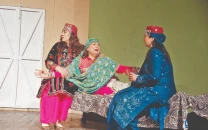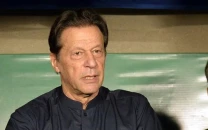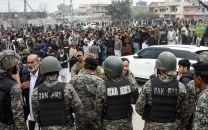The killing fields

The killing fields
We barely squirm now as we see sights that include mangled limbs or small rivulets of blood that find their way into the cracks and crevices of sidewalks. It has become apparent too that the value of human life has diminished dramatically. News of a few dozen more deaths barely shakes us.
The militant attacks that claim them have become merely another part of reality. This is not how it should be. Over 70 people have died within the last three days in Peshawar and Kohat. The victims included displaced persons forced into camps with almost no ability to protect themselves and a five-year-old child killed at his school in the NWFP capital.
These people, and the activists of a religious party targeted at the Qissa Khwani bazaar, had nothing to do with the policies the extremists oppose. They were merely doing all they possibly could to move ahead with the ordinary things of life one group had left their homes and moved to a secure place to escape a military operation while the other was protesting against loadshedding.
Even this survival, at the most basic level of existence, is becoming increasingly difficult in this country. Particularly in Khyber-Pakhtunkhwa but also elsewhere, the bombers remain able to strike at will. A Quetta hospital was targeted just days ago. It has become impossible to suggest means to prevent such attacks.
The harsh fact is that no matter how much we criticise the security apparatus, all street corners and all buildings cannot in practice be guarded around the clock. No nation would be able to do so. We face today an entire army of frenzied killers, able to move undetected amongst us. Some reports suggest those who struck the IDP camp in Kohat may have come in from Punjab.
In any case, they were reportedly wearing burqas which means that the monsters took advantage of our reluctance to screen women for security. It is becoming obvious that despite waging a war that has continued now for almost a year – at an accelerated pitch – since May 2009 when the operation in Swat began, we are really not much closer to vanquishing terror.
We need to ask ourselves the reasons for this. While the militants have in many places been defeated, the root causes behind extremism have not been addressed. It is after all no coincidence that the bombers who create havoc in our bazaars, our schools and other places come from some of the most poverty-stricken reaches of the country.
In southern Punjab, as well as in the north, where the extremist problem is most deeply rooted, people lack access to the most basic requirements of life. Madrassahs preaching obscurantism have usurped the place that should be taken by schools; roadside quacks cater to the health needs of people who have no access to doctors or hospitals.
They are also for the most part denied even a modicum of social justice or the dignity of a civilised life. For generations there has been no meaningful land reform and limited development. And this all shows in our abysmal rankings on universally accepted development indicators such as, for instance, the UNDP’s Human Development Index, where Pakistan does worse compared to even India, Sri Lanka and Bangladesh.
And as this happens our defence budget and government expenditures keep pace with inflation and not at the cost of their employees’ welfare. It is the majority of Pakistanis who have suffered for them life is drudgery, a miserable existence with no electricity for much of the day, no clean water to drink, no physical security of life and no assurance that they will be treated equally before the law.
This is a vicious cycle that feeds itself poverty creates conditions ripe for children to be indoctrinated in madrassahs and that, by and large, is the pool of future suicide bombers. We need to break this cycle we need to fight poverty as if it is a war.



















COMMENTS
Comments are moderated and generally will be posted if they are on-topic and not abusive.
For more information, please see our Comments FAQ